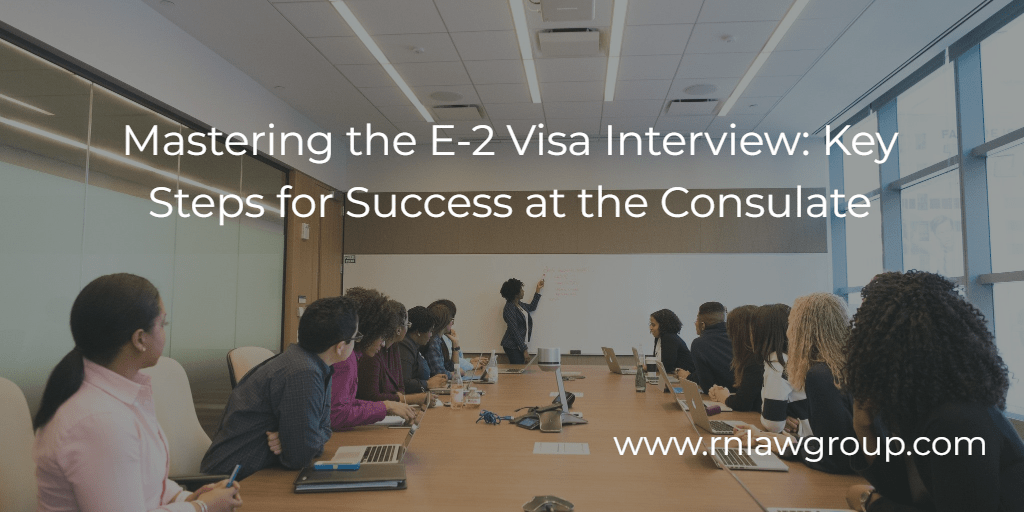
Mastering the E-2 Visa Interview: Key Steps for Success at the Consulate
The E-2 Treaty Investor Visa allows citizens of specific countries to invest a substantial amount of capital in a U.S. business and work for that business as part of their investment. Obtaining an E-2 visa involves several steps, but one of the most crucial is the interview at the U.S. consulate. This interview assesses the applicant’s qualifications, intent, and investment viability. Here’s a guide to prepare for and succeed in your E-2 visa interview.
- Understand the E-2 Visa Requirements
Before preparing for the interview, ensure you have a strong understanding of the E-2 visa’s eligibility criteria. Familiarity with these requirements will help you anticipate potential questions and prepare appropriate responses. Here’s a quick rundown:
- Nationality: The applicant must be a citizen of a treaty country with which the U.S. maintains a treaty of commerce and navigation.
- Investment: The applicant must have invested, or be in the process of investing, a significant amount of capital in a U.S. business.
- Business Ownership: The applicant should own at least 50% of the business or otherwise exercise control over it.
- Intent to Depart: The applicant must show that they intend to leave the U.S. when their E-2 status expires.
- Active Business: The investment must be in a real, active business, not a passive one like stocks or real estate holdings.
- Review Your Application Packet
Consular officers may ask questions related to any part of your E-2 application packet. Familiarize yourself with each document in your application, as well as the overall business plan. Key components include:
- Investment Evidence: Be prepared to provide documentation of your investment, including bank statements, wire transfers, or purchase agreements.
- Business Plan: Consular officers expect a detailed business plan that clearly outlines your projected revenue, expenses, and anticipated employment impact.
- Source of Funds: You should be able to explain the source of your investment funds and provide documentation, such as tax returns, financial statements, and bank records.
- Anticipate and Practice Interview Questions
Prepare for the interview by reviewing common E-2 visa interview questions. Practicing responses to these questions can help you feel more confident and articulate during the actual interview.
Typical Questions to Expect:
- Why did you choose to invest in this business?
- Discuss your motivation for choosing your specific business. Be prepared to highlight how it fits with your background, expertise, or interests.
- Can you explain the business’s purpose and your role in it?
- Explain the nature of your business, including its products or services, target audience, and projected growth. Be clear about your role in the business and how you plan to contribute to its success.
- How much did you invest in the business? How did you get these funds?
- Be transparent about the total investment amount and have records proving the legality of your funds’ source.
- How will your business benefit the U.S. economy?
- Highlight how your business will create jobs, contribute to the local economy, or fill a niche in the market.
- Prepare Your Financial Documentation
The financial aspect is a critical part of the E-2 visa interview. Consular officers will want to verify that your investment is substantial and at risk. Bring copies of financial documents that clearly show:
- Your initial investment: Show how the funds were spent in the U.S., for example, on equipment, rental deposits, or initial operational costs.
- Ongoing financial stability: Evidence of working capital or bank statements demonstrating that the business can support itself.
- Source of Funds: Have documentation to prove the legality of your funds, such as tax returns, business income records, or bank statements.
- Demonstrate Active Management and Job Creation
The E-2 visa is designed for investors actively involved in the business, not passive investors. Show that you play a direct role in managing and operating the business:
- Day-to-day Involvement: Emphasize your role in the day-to-day operations and decision-making within the business.
- Staffing Plan: Even if you haven’t hired employees yet, discuss your hiring strategy and the types of positions you plan to create. This can indicate your business’s growth potential and economic benefit to the U.S.
- Present a Strong Business Plan
An essential part of your application is the business plan. During the interview, consular officers may ask about specific aspects of your business, such as projected revenue, marketing strategy, or competitive analysis. Key components to have ready are:
- Detailed Financial Projections: Highlight how you plan to make the business profitable within a few years.
- Market Analysis: Be able to explain the demand for your product or service and how you plan to attract customers.
- Growth Strategy: Outline your business’s expansion plans and how they will benefit the local economy.
- Dress and Present Yourself Professionally
First impressions matter. Dressing professionally and behaving confidently at the interview reflects your seriousness about the investment and your business’s potential success.
- Dress Code: Wear business attire that reflects the professional image of your business.
- Body Language: Be calm, polite, and confident in your responses.
- Be Honest and Direct in Your Responses
Honesty and clarity are essential. If you don’t know the answer to a question, it’s okay to admit it rather than offering uncertain information. Consular officers are skilled at detecting inconsistencies, so aim to be as transparent as possible.
- Stay on Topic: Keep answers focused and relevant to the questions asked.
- Acknowledge Limitations: If there are aspects of the business you’re still developing, explain your plans without overstating your progress.
- Bring Essential Documentation in an Organized Folder
Although the consulate has access to your submitted application, it’s a good idea to bring a neatly organized folder with copies of key documents:
- Proof of Investment: Bank statements, contracts, and receipts.
- Source of Funds: Documentation showing where your investment funds originated.
- Business Plan and Financial Projections: A printed copy of your business plan for easy reference.
- Proof of Business Ownership or Control: Articles of incorporation, operating agreements, or stock certificates.
- Employment Records (if applicable): Documentation of any U.S.-based employees you have hired.
- Show a Clear Intent to Return
Since the E-2 visa is a nonimmigrant visa, you must show that you intend to leave the U.S. upon completion of your business activities. While consular officers don’t typically require extensive evidence, you should be prepared to demonstrate:
- Strong Ties to Your Home Country: Documents like family records, property ownership, or financial commitments in your home country can help.
- Plan for Reentry: Explain how you’ll either manage the business remotely or transfer operations if you decide to return.
Conclusion
The E-2 visa interview can feel intense, but thorough preparation can significantly increase your chances of success. Familiarize yourself with your business’s finances, structure, and growth potential, and be ready to discuss each aspect confidently and clearly. With careful organization, a firm understanding of your business, and a calm demeanor, you’ll be well-prepared to succeed in your E-2 visa interview at the consulate.
By: Felipe Jimenez
Felipe Jimenez is an Associate Attorney at Reddy Neumann Brown PC. He works in the Non-Immigrant Visa (NIV) Department where he assists clients through all phases of the non-immigrant visa process.
Reddy Neumann Brown PC has been serving the business community for over 20 years and is Houston’s largest immigration law firm focused solely on US. Employment-based immigration. We work with both employers and their employees, helping them navigate the immigration process quickly and cost-effectively.

